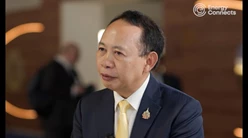US Ends LNG Ship Penalty, Sets Tariffs in Escalating Feud With China
(Bloomberg) -- The Trump administration scrapped penalties for US liquefied natural gas companies that were set to take effect next week under a sweeping policy aimed at curbing China’s maritime dominance.
“This modification will avoid potential short-term disruptions to the LNG sector while promoting investments in U.S. shipbuilding capacity and production of LNG vessels,” the Office of the US Trade Representative said in a notice on Friday.
The provision, which is effective immediately, would have allowed the US to suspend LNG export licenses for companies that failed to meet requirements for shipping fuel on US-built LNG tankers starting in the second half of the decade. American LNG companies warned that existing shipbuilding capacity in the US is not equipped to churn out specialized LNG tankers, which are mainly built in South Korea and Japan.
The policy aimed at Beijing’s dominance of the maritime sector was finalized in April. It includes fees on ships calling at US ports that are either made in China or that are Chinese-operated, set to take effect on Oct. 14. The plan looks to revive the US shipbuilding industry as a way to combat China’s strength in the shipping and shipbuilding sectors.
The USTR also said Friday it would impose tariffs of 100% on ship-to-shore cranes and intermodal chassis and parts, a move that targets Chinese-made port equipment. Those duties will be effective as of Nov. 9.
Included in the notice on Friday is a proposal to levy additional tariffs of up to 150% on certain Chinese-origin cargo handling equipment, like the gantry cranes, straddle carriers and container-stacking tractors widely used at American seaport terminals. The USTR said it would accept comments on that and other related proposals until Nov. 10.
Earlier: Trump Announces Additional 100% China Tariff, Tech Controls
The notice came as Trump on Friday announced that he would impose an additional 100% tariff on Chinese exports as well as controls on “any and all critical software” beginning Nov. 1, and threatened to cancel an upcoming meeting with Chinese President Xi Jinping, dramatically raising the stakes for talks between the world’s two largest economies on trade.
©2025 Bloomberg L.P.





